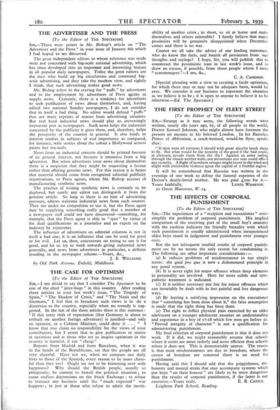THE ADVERTISER AND THE PRESS [To the Editor of THE
SPECTATOR] SIR,—There were points in Mr. Bishop's article on " The Advertiser and the Press " in your issue of January 6th which I had hoped to see discussed.
The great independent editors to whom reference was made were not concerned with big-scale national advertising, which has since developed into an important and interesting feature in all popular daily newspapers. Today the great editors are the men who build up big circulations and command big- scale advertising, and they take the modern view, and rightly I think, that such advertising makes good news.
Mr. Bishop refers to the craving for " puffs " by advertisers and to the employment by advertisers of Press agents to supply news. Certainly, there is a tendency for advertisers to seek publication of news about themselves, and, having edited two national Sunday newspapers, I do not consider that in itself a bad thing. No editor would defend " puffs " that are mere reprints of matter from advertising columns. But real hard industrial news should play an increasingly important part in newspapers. Such news helps the industries concerned by the publicity it gives them, and, therefore, helps the prosperity of the country in general. It also tends to interest readers in subjects of real importance as compared, for instance, with stories about the colour a Hollywood actress paints her toe-nails.
News from an industrial concern should be printed because of its general interest, not because it emanates from a big atdvertiser. But when advertisers issue news about themselves there is a suspicion that they might be requesting a favour rather than offering genuine news. For this reason it is better that material should come from recognised editorial publicity organisations, or Press agents, whom Mr. Bishop accuses of manufacturing synthetic news.
The practice of issuing synthetic news is certainly to be deplored, but surely any editor can distinguish it from the genuine article. So long as there is no hint of advertising pressure, editors welcome industrial news from such sources. They are under no compulsion to use it, but the Press agent may be supplying something really good that a member of a newspaper staff could not have discovered—something, for example, that the Press agent is able to " spot " by virtue of his dual qualifications as a journalist and an expert on the industry he represents.
The influence of advertisers on editorial columns is not in itself a bad one; it is an influence that can be used for good or for evil. Let us, then, concentrate on trying to use it for good, and let us try to work towards giving industrial news generally, and news from advertisers in particular, a definite standing in the newspaper scheme.—Yours, &c.,










































 Previous page
Previous page